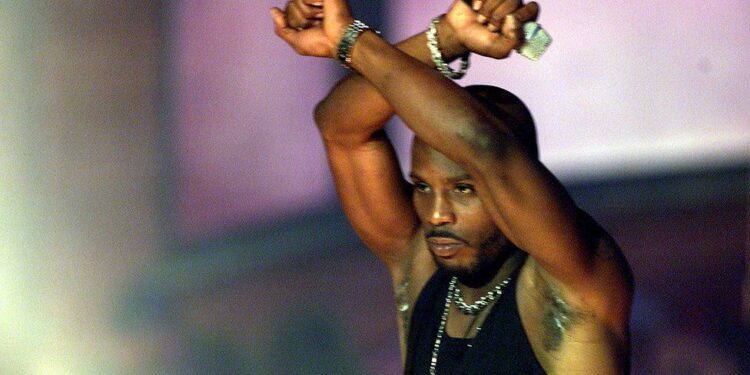Rapper DMX was one of America’s most successful stars of the late 1990s and 2000s, whose achievements earned him a place in music history when he became the first artist to see his first five albums go to number one in the Billboard charts.
They sold 14 million copies in the US and earned him three Grammy nominations, and he enjoyed a parallel career as the star of blockbuster action films.
The secret to DMX’s musical power was his singular ability to be commercial while keeping his hardcore credibility intact.
READ MORE: DMX, American rapper and actor, dies aged 50
READ MORE: DMX, American rapper and actor, dies aged 50
Intensity and theatricality were his trademarks, from his imposing muscular and tattooed physique to the gruffness of his delivery.
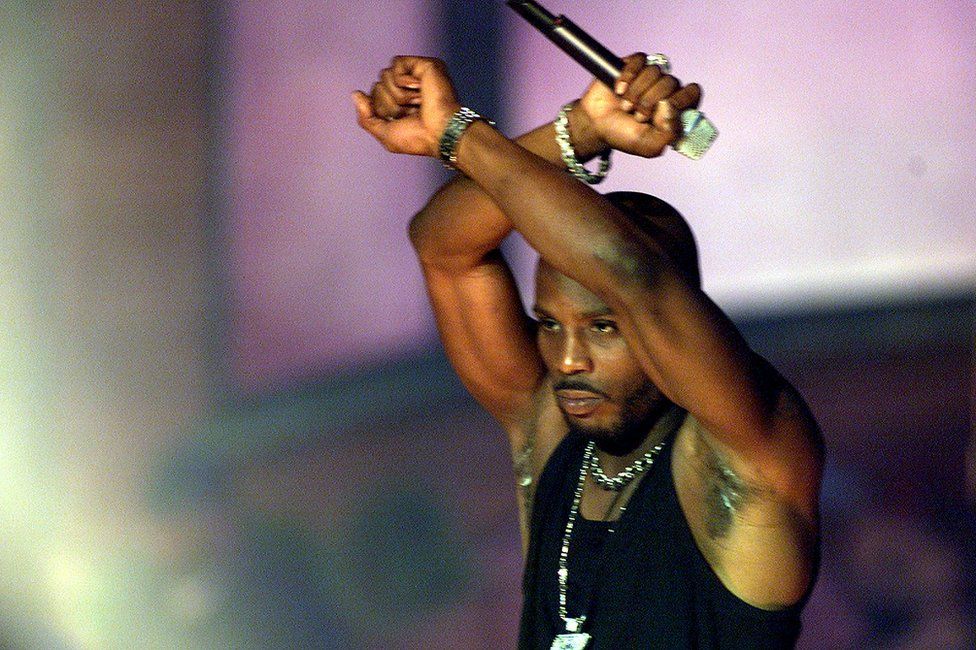 IMAGE COPYRIGHTGETTY IMAGES
IMAGE COPYRIGHTGETTY IMAGES
But DMX was more than a carefully curated performer for whom style masked a lack of substance. His lyrics switched between pained soul-searching spirituality and the very real and present dangers of life on the street.
Over the years, the emotional intensity of DMX’s music was equalled, and arguably driven, by his very public battle with inner demons, which led to years of substance abuse, stints in rehab, multiple arrests and prison sentences for offences including drug and unlicensed gun possession, animal cruelty, tax evasion and assault.
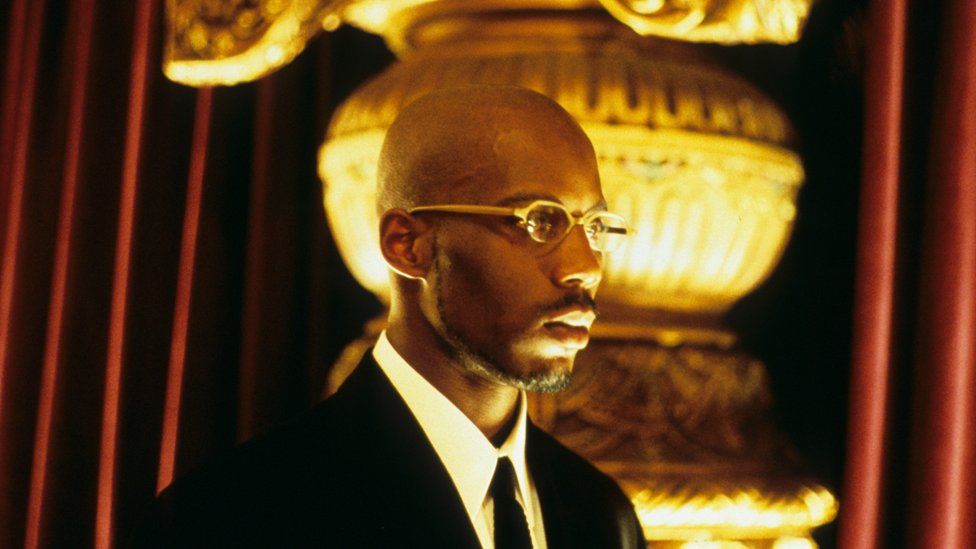 IMAGE COPYRIGHTALAMY
IMAGE COPYRIGHTALAMY
In an interview in 2020 with fellow rapper and activist Talib Kweli on his People’s Party podcast, DMX told how his crack addiction began at 14 when a 30-year-old music mentor offered him a marijuana cigarette that had been laced with crack cocaine.
“This guy, this guy, this guy… he introduced me to the best part of my life which would be the rap, but he passed the blunt around and I hit the blunt,” he said.
“I later found out that he laced the blunt with crack. Why would you do that to a child? He was like 30 and he knew I looked up to him. Why would you do that to someone who looks up to you?”
Harsh beginnings
DMX was born Earl Simmons on 18 December 1970, and grew up in Mount Vernon, New York.
His troubled and abusive childhood saw him living in children’s homes and getting involved in violence and crime, leading to several run-ins with the police and his first arrest at 15. Those experiences were later expressed in his tortured, candid lyrics about ghetto life.
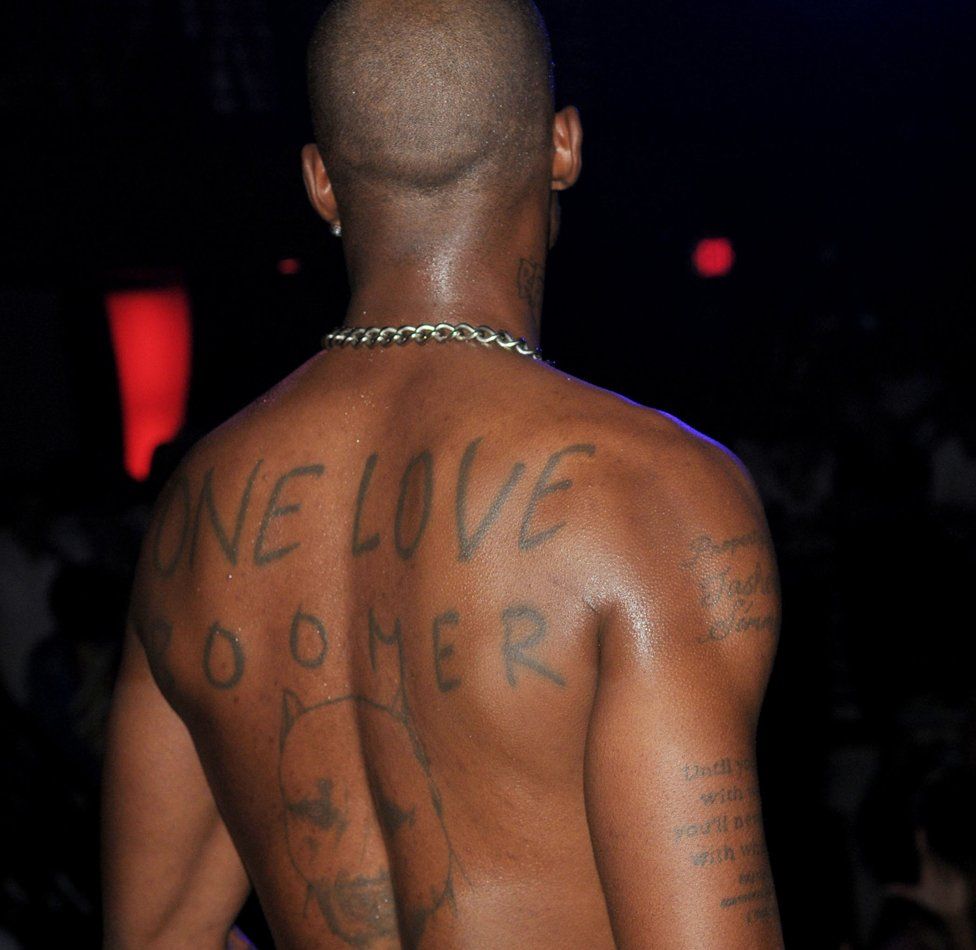 IMAGE COPYRIGHTALAMY
IMAGE COPYRIGHTALAMY
DMX also learned to befriend stray dogs, developing a strong bond with his canine friends and later having his former pet, Boomer, tattooed on his back after the dog was struck and killed by a car. DMX often used dog imagery in his lyrics, as heard in his first hit single Get At Me Dog in 1998.
The song was a gold-selling smash on the rap and dance charts and paved the way for his full-length debut, It’s Dark And Hell Is Hot, to enter the Billboard chart at number one.
The same year, his autobiographical single Slippin‘ would recount the rapper’s troubled life, and the track was played in federal court before the rapper’s 2018 sentencing for tax evasion.
“His life experiences were horrible,” his lawyer Murray Richman said at the time. “I’ve heard terrible tales, but I’ve never heard of such a horrible upbringing as this.”
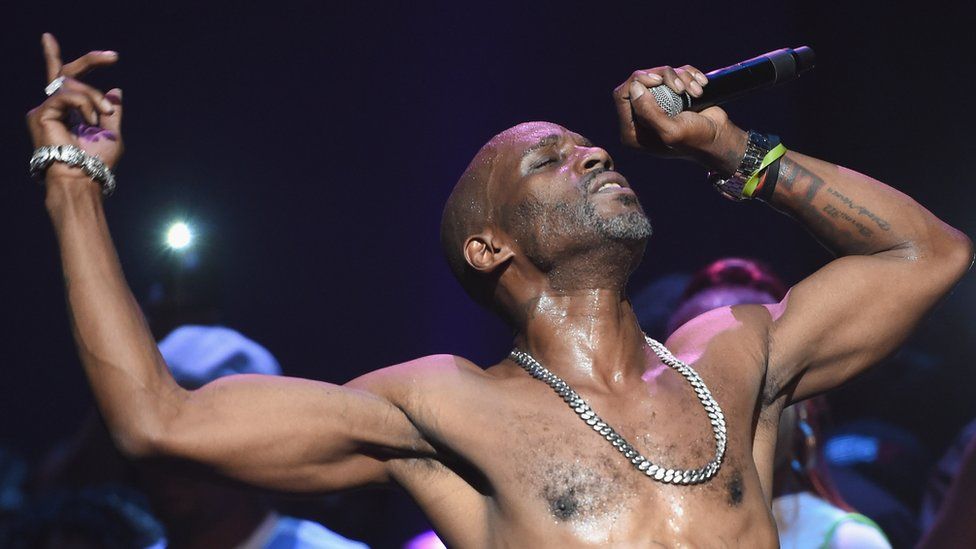 IMAGE COPYRIGHTGETTY IMAGES
IMAGE COPYRIGHTGETTY IMAGES
DMX found his saving grace in hip-hop, starting out as a DJ and human beatbox, and later moving into rapping, taking his name from the DMX digital drum machine (although some suggest it also stood for Dark Man X).
Still unknown when he signed to Columbia Records in 1992, the rapper was given little attention from the label and his promotional single Born Loser came and went unnoticed.
READ MORE: Regé-Jean Page turned down $200K offer to appear in ‘Bridgerton’ season 2
READ MORE: Regé-Jean Page turned down $200K offer to appear in ‘Bridgerton’ season 2
DMX complained about the label’s neglect and was let out of his contract. He issued one further single in 1994, Make A Move, but was convicted of drug possession that same year.
Ready ‘to blow’
He began to rebuild his career by providing guest vocals, including on LL Cool J’s 4, 3, 2, 1 and Mase’s 24 Hours To Live.
Then came It’s Dark And Hell Is Hot, which led to him being compared to the late rapper Tupac Shakur due to the force of his vocal presence.
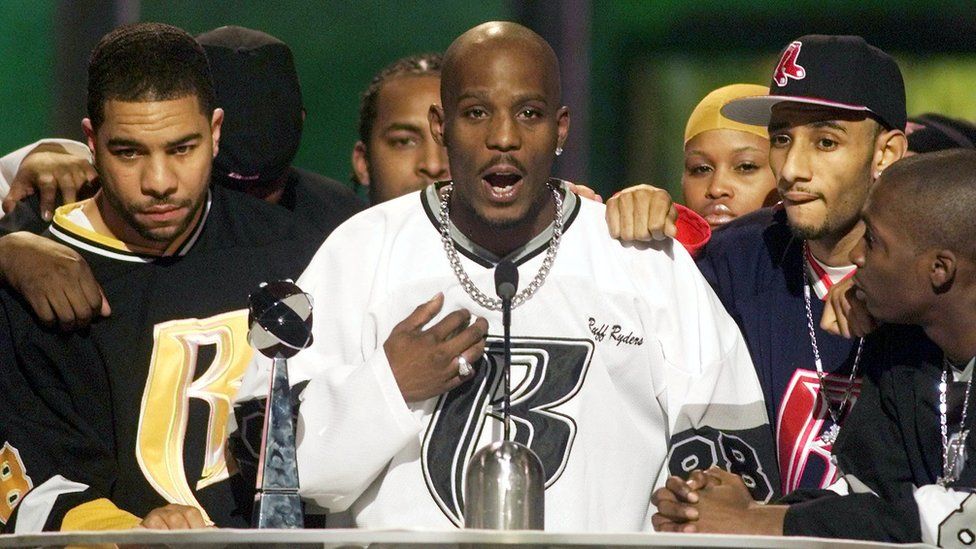 IMAGE COPYRIGHTGETTY IMAGES
IMAGE COPYRIGHTGETTY IMAGES
“I think society is finally ready to deal with reality,” he’s reported to have told Def Jam Records in 1998. “So for that reason I ain’t got no choice but to blow!”
Not long after the album’s release, he was accused of rape, but was later cleared by DNA evidence. He went on to make his feature film debut in Hype Williams’ ambitious but unsuccessful Belly, which was criticised for its violence.
DMX was already working on his second album Flesh of My Flesh, Blood of My Blood. It featured a controversial cover photo of the rapper covered in blood – but unfazed, fans pushed the album to the top of the chart.
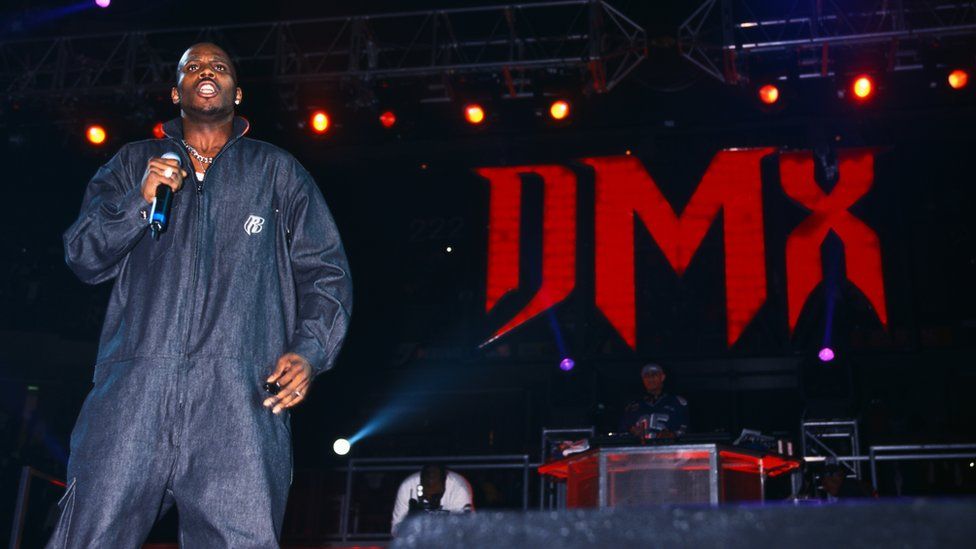 IMAGE COPYRIGHTGETTY IMAGES
IMAGE COPYRIGHTGETTY IMAGES
Like his debut, DMX said he wanted it to convey the raw, personal trials and obstacles of life. “I want Flesh of My Flesh to be like my connection to the community,” he said.
“I want to say what’s on my people’s minds, soak up all their pain. I’ve learned that when I take it all in, I can make one brotha’s pain be understood by the world.”
With the album’s success, DMX became the first rap artist to have his first two albums reach US number one within a year. “I wrote fast,” DMX told MTV in 1999.
 IMAGE COPYRIGHTWASHINGTON POST/GETTY
IMAGE COPYRIGHTWASHINGTON POST/GETTY
That year, he joined the Hard Knock Life tour with fellow rap stars Jay-Z, Method Man, and Redman, and formed an ill-fated rap supergroup with Jay-Z and Ja Rule.
As a solo artist, DMX proved to be no flash in the pan, going on to top the charts again with his third and best-selling album And Then There Was X, which was nominated for best rap album at the Grammys; and the follow-ups The Great Depression and Grand Champ.
He also released singles like Ruff Ryders’ Anthem, What’s My Name, Party Up (Up In Here), and Who We Be, the latter two of which were also Grammy-nominated.
While DMX preserved his status as a rap icon, he also sought other outlets for his talents.
 IMAGE COPYRIGHTALAMY
IMAGE COPYRIGHTALAMY
He starred in the action films Romeo Must Die, with Jet Li and Aaliyah in 2000, and Exit Wounds, with Steven Seagal in 2001, which became box office hits despite lacklustre reviews. They were was followed by a reunion with Li in 2003’s Cradle 2 The Grave.
In his review of Cradle 2 the Grave, Scott Brown of Entertainment Weekly said of DMX: “He’s not what you’d call a good actor – he’s not even what you’d call an actor – but… he’s shaping himself into a genuinely appealing screen presence.”
The music kept coming too, with the release of 2006’s album Year Of The Dog… Again, and Undisputed in 2012.
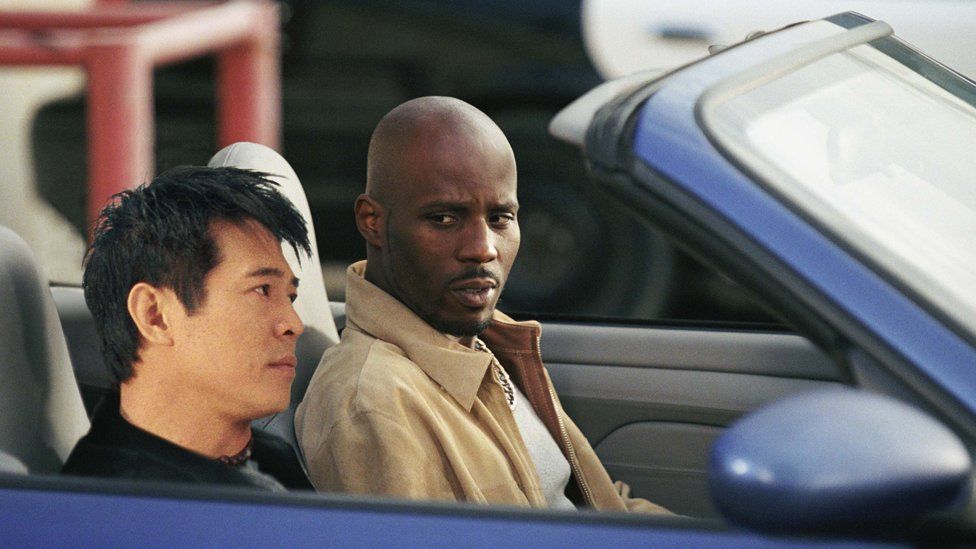 IMAGE COPYRIGHTALAMY
IMAGE COPYRIGHTALAMY
But his battle with drugs remained a powerful force and led to convictions for drug and gun possession. In 2001, he served a 15-day prison sentence for a driving offence, during which he was accused of assaulting a guard. There were also further legal issues involving animal cruelty, reckless driving and theft, some of which led to spells in prison.
The rapper’s mental health became a topic in some interviews, and in particular whether he had bipolar disorder.
In a 2011 interview with ABC 15 Arizona, the rapper said “X” wasn’t a true reflection of himself.
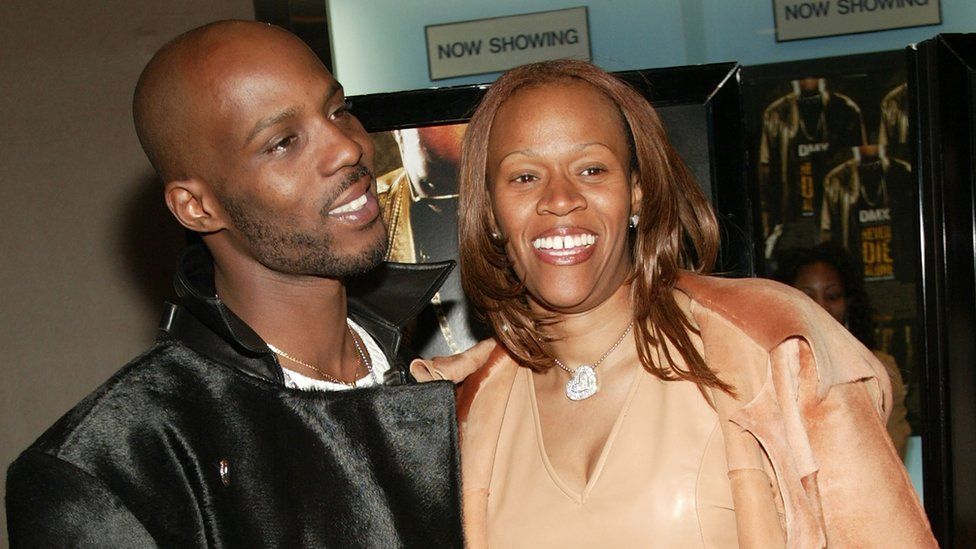 IMAGE COPYRIGHTGETTY IMAGES
IMAGE COPYRIGHTGETTY IMAGES
“X is the bad guy. That’s not who I am. I’m not the person the media portrays me to be,” he said. “I used to be really clear on who was what and what characteristics each personality had.
“But I don’t know. At this point, I’m not even sure there is a difference. I’m Earl when I’m with my children. I miss my children.” The rapper had 15 children from several relationships. He wed Tashera Simmons in 1999 and they were married for 11 years and remained friends.
In 2016, a near-fatal overdose saw DMX collapse in the parking lot of a hotel in New York. He was revived when a paramedic injected him with an anti-opioid used to reverse the effects of a heroin overdose.
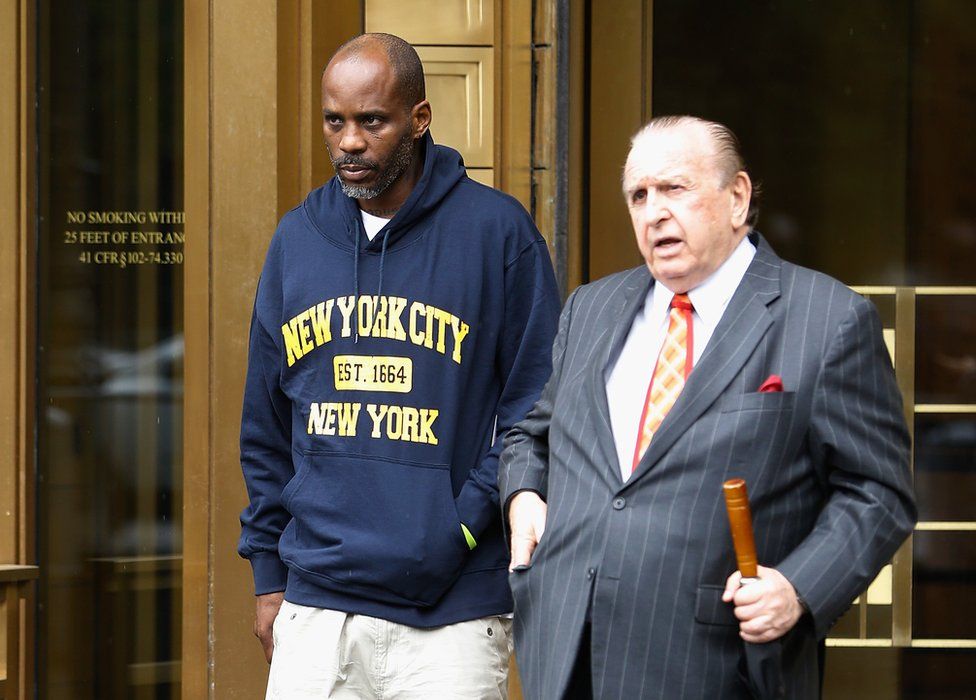 IMAGE COPYRIGHTGETTY IMAGES
IMAGE COPYRIGHTGETTY IMAGES
The following year, he cancelled a series of performances to re-enter rehab. “It is important right now that he take some time off to focus on his health so that he can be a better father, friend and entertainer,” his manager Pat Gallo said.
Prosecution for tax evasion followed in 2018, with the rapper owing $1.7m in unpaid taxes from income made between 2002 and 2005. He was also found to have failed to have filed taxes from 2010 to 2015, during which time he was estimated to have made at least $2.3m.
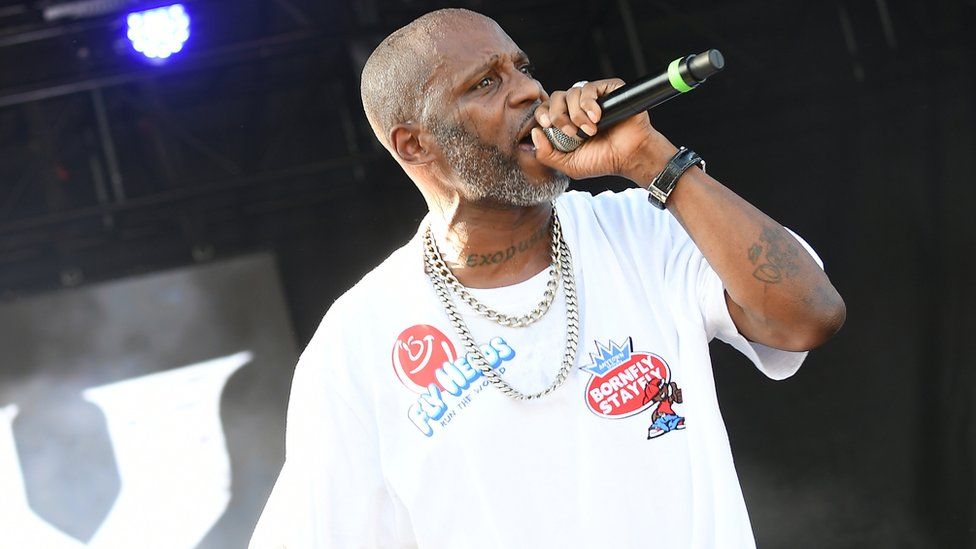 IMAGE COPYRIGHTGETTY IMAGES
IMAGE COPYRIGHTGETTY IMAGES
A judge called his tax fraud “brazen and blatant” and sentenced him to one year in prison. Following his release in 2019, DMX returned to rehab.
In his interview with Talib Kweli, DMX said he had learned that it was important for his recovery to be open about his problems and to not be afraid to ask for help.
“I learned that I had to deal with the things that hurt me,” the rapper said. “I didn’t really have anybody to talk to… in the hood, nobody wants to hear that.
“Talking about your problems is viewed as a sign of weakness when actually it’s one of the bravest things you can do. One of the bravest things you can do is put it on the table, chop it up, and just let it out.”
Source: BBC
Source: BBC
ADVERTISEMENT


